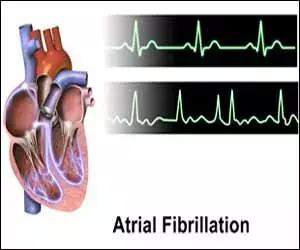
AI Can Predict New Atrial Fibrillation, Stroke Risk, Claim Researchers
- byDoctor News Daily Team
- 18 February, 2025
- 0 Comments
- 0 Mins

DANVILLE: A team of scientists from Geisinger and Tempus have found that artificial intelligence can predict risk of new atrial fibrillation (AF) and AF-related stroke.
Atrial fibrillation is the most common cardiac arrhythmia and is associated with numerous health risks, including stroke and death. The study, published in Circulation, used electrical signals from the heart--measured from a 12-lead electrocardiogram (ECG)--to identify patients who are likely to develop AF, including those at risk for AF-related stroke.
"Each year, over 300 million ECGs are performed in the U.S. to identify cardiac abnormalities within an episode of care. However, these tests cannot generally detect future potential for negative events like atrial fibrillation or stroke," said Joel Dudley, chief scientific officer at Tempus. "This critical work stems from our major investments in cardiology to generate algorithms that make existing cardiology tests, such as ECGs, smarter and capable of predicting future clinical events. Our goal is to enable clinicians to act earlier in the course of disease."
To develop their model, the team of data scientists and medical researchers used 1.6 million ECGs from 430,000 patients over 35 years of patient care at Geisinger. These data were used to train a deep neural network--a specialized class of artificial intelligence--to predict, among patients without a previous history of AF, who would develop AF within 12 months. The neural network performance exceeded that of current clinical models for predicting AF risk. Furthermore, 62% of patients without known AF who experienced an AF-related stroke within three years were identified as high risk by the model before the stroke occurred.
"Not only can we now predict who is at risk of developing atrial fibrillation, but this work shows that the high risk prediction precedes many AF-related strokes," said Brandon Fornwalt, M.D., Ph.D., co-senior author and chair of Geisinger's Department of Translational Data Science and Informatics. "With that kind of information, we can change the way these patients are screened and treated, potentially preventing such severe outcomes. This is huge for patients."
For further references log on to:
http://dx.doi.org/10.1161/CIRCULATIONAHA.120.047829
Disclaimer: This website is designed for healthcare professionals and serves solely for informational purposes.
The content provided should not be interpreted as medical advice, diagnosis, treatment recommendations, prescriptions, or endorsements of specific medical practices. It is not a replacement for professional medical consultation or the expertise of a licensed healthcare provider.
Given the ever-evolving nature of medical science, we strive to keep our information accurate and up to date. However, we do not guarantee the completeness or accuracy of the content.
If you come across any inconsistencies, please reach out to us at
admin@doctornewsdaily.com.
We do not support or endorse medical opinions, treatments, or recommendations that contradict the advice of qualified healthcare professionals.
By using this website, you agree to our
Terms of Use,
Privacy Policy, and
Advertisement Policy.
For further details, please review our
Full Disclaimer.
Tags:

Recent News
Normal-Tension Glaucoma Closely Associated With Co...
- 10 October, 2022
Air Pollution Tied To Increased Risk Of Premature...
- 24 May, 2023

Daily Newsletter
Get all the top stories from Blogs to keep track.


0 Comments
Post a comment
No comments yet. Be the first to comment!